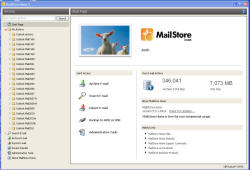
I've been saving every email for more than 15 years. It is a great historical resource to be able to go back to. I've been using Outlook for the entire time because I think it is an amazingly productive tool. Unfortunately, Outlook stores emails in PST files. These files are fragile (they get corrupted easily) and proprietary, so I want to find a better way to store and search my emails going into the distant future.
As the first step in this process, I wanted to export all the emails in all my PST files into a format that would be easy to use and search and that would still be readable for decades to come. I decided on RFC822 ("EML" files) and HTML.
I needed a way to export from PST to these formats. I wanted....
To test the various solutions, I used one very old (1996) and one very new (2011) PST file and exported the first 25 emails from each. Then I checked the resulting files to how well the solution worked.
For almost everyone, this free program will be good enough. You can import millions of emails from your PST files and easily do simple searches.
It can also do a fairly complete export into standard RFC822 files, so you are not trapped incase you ever wanted to stop using it.
Unfortunately, it is missing two key features that I need...
Sadly, both of these flaws would be trivial to fix but not much I can do to get around them.
Open source indexing engine. I just could not get this to work at all. I'd import a bunch of EML files, but nothing would show up in the index.
Q: But wait, what about all the messaging and sequencing and indexing?
A: This code is only the matching engine, which sits on top of plenty of other
support software. All the networking and message sequencing code is written in
hard code C and ASM. Any place you see INT97that is a
call down to this code. But that is just plumbing. This also depends on FoxPro's
ISAM indexing engine which uses a B*tree and is still impressive in its
performance and reliability even 20 years later. Any place you see a
SEEK, that is a call down to the FoxPro indexer.
1/2/2012: First published